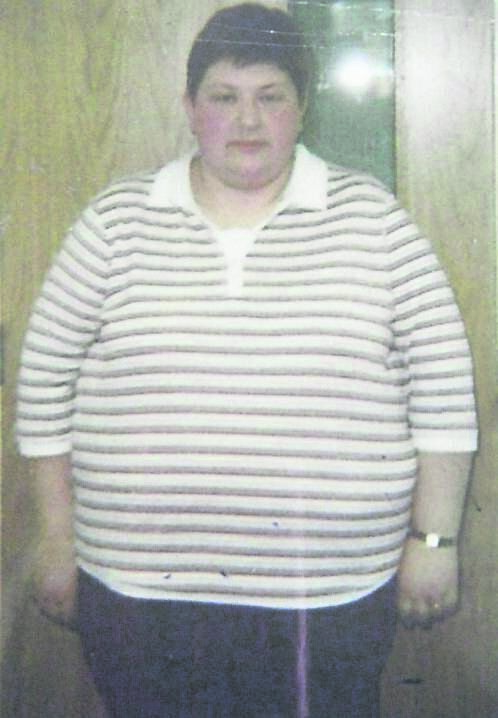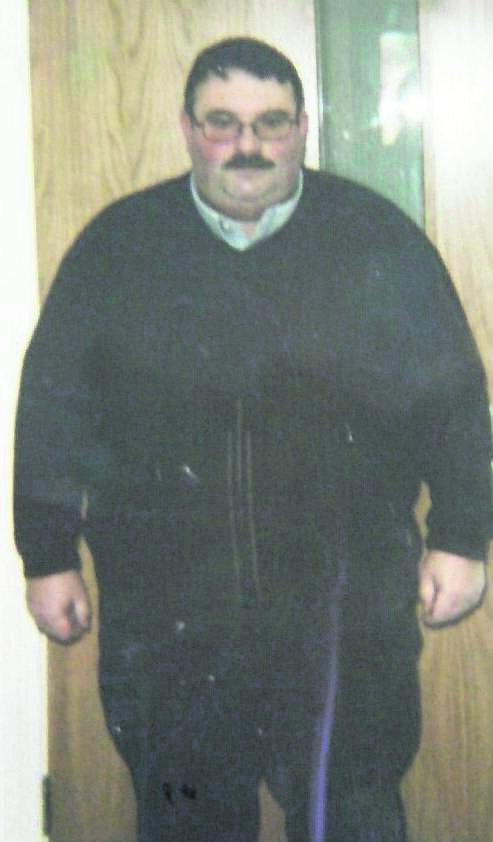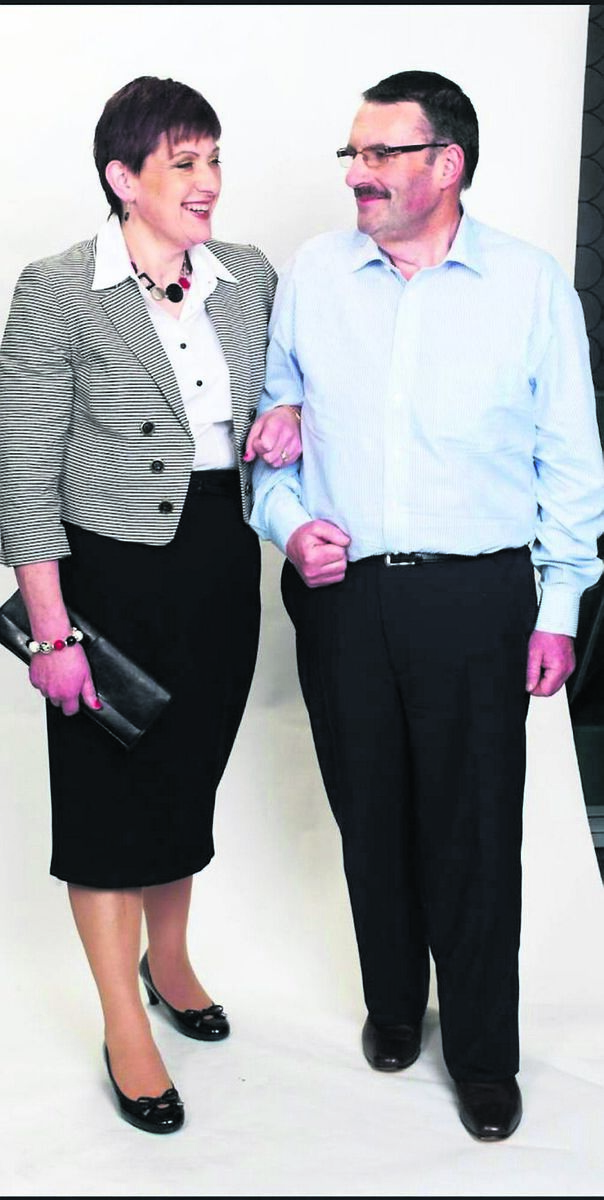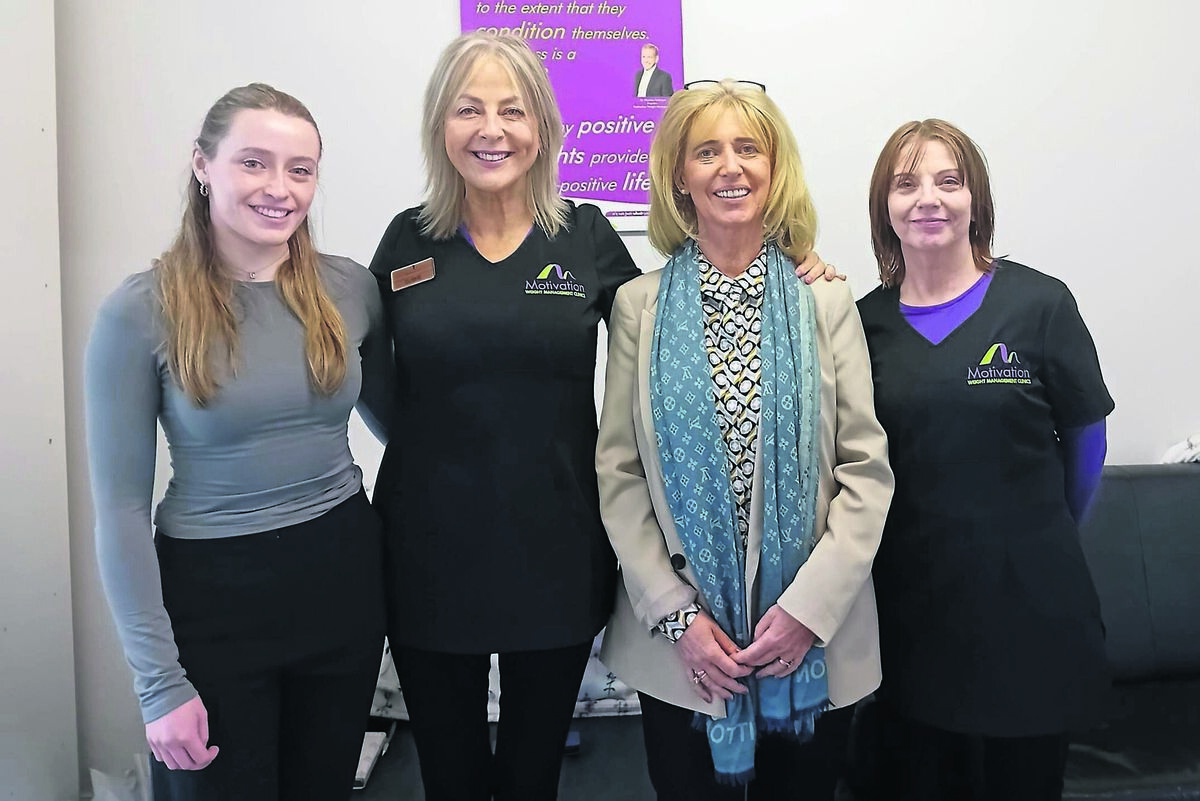Cork couple lost 23 stone after embarking on regime together

Sandra and Frank Buttimer, who lost a combined 23 stone at Motivation.
A Cork couple has revealed that they lost an incredible 23-stone between them after embarking on a diet regime together.
Sandra and Frank Buttimer decided to use a combination of dieting and exercise together to address their weight issues.
They attended a clinic in Carrigaline run by the Motivation weight loss company.
Sandra took the lead and said: “It was when my sister was getting married that I decided to call to my local Motivation office in Carrigaline and join up.
“I rang my husband Frank and told him what I was doing. ‘Do you know what,’ he said, ‘join me up too and we’ll do it together’.
Sandra says that Frank has been her rock through the whole journey.

She said her weight issues began when she was 12 years old.
“It was partly stress,” she says, “and also bad habits. I loved cooking and baking at weekends and this led me to putting on weight.”
It was hard to lose the weight, Sandra says, as it took so long, “but it has been so worth it”.
She added: “Walking has been a huge help, but last year I decided to join the gym.
“I had put on a stone again due to the menopause and doing the weight training got me back in shape. “
Do the couple ever let their hair down and not count the calories?

“Yes, Sunday is our free day, we might go out to lunch and we’ll enjoy that as our treat.”
The changes in Sandra’s health have been astounding.
She used to have high blood pressure, diabetes, and high cholesterol, all of which she took medications for. Not any more! Sandra takes no medications these days and has never felt better.
Weight loss and management, anyone else confused?
Trying to manage our weight has become harder in recent times.
Between over-processed foods, hidden fats and sugars, and fast food only a phone call away, I can’t possibly be the only one finding it all a bit overwhelming.
With 24% of Irish people now clinically obese and a larger percentage overweight, what effect is this having on our health, and how can we manage it?
We’re supposed to be embracing the way we are, but also we’re meant to be slim and health-conscious.
To find out what the dieters in Cork are talking about and what they are facing, I met Motivation Area Manager Carla Connolly and her team at their clinic in Ballincollig.

Motivation was founded in Dublin 30 years ago. They now have several clinics in Dublin, one in Limerick, one in Wicklow, and two in Cork.
For 23 years, the clinic has been helping its clients in Cork to lose weight and to keep it off. They have a holistic approach to weight management.
The group motto is ‘It’s not what you eat, it’s why you eat’.
Its not just about diet, Carla says, it’s about behaviour modification, changing the habits, changing attitude.
“Half of what we focus on is food, the other half is behaviour,” she said. “We have a concept called mental weight.
“Many of the clients that come into us would carry weight for a variety or reasons, everything from stress, emotional eating, boredom, and guilt.
“It’s not just about addressing the diet, it’s about identifying and addressing the triggers,” added Carla.
Are some people predisposed to obesity?
“A certain number are, about 20% can be affected by genetics but mostly it's lifestyle choices,” says Carla.
Does she believe in the philosophy of ‘eat less, move more’?
“Some of our clients have physical restrictions so exercise can be so much harder. Not necessarily because of the extra weight but because of underlying conditions, for example fibromyalgia.
“They can still lose weight, but it’s not a one size fits all.
“Diet is a huge part of how people with restrictions can lose weight, but it can also be about changing habits.
Do we need a re-education around over-processed foods?
“Oh 100%,” says Carla. “Schools don’t have the education, the teachers don’t have the education and many parents are putting foods into the lunch boxes that they think are healthy, but aren’t.
“Also, many lunchboxes are filled with what’s convenient. We need to teach children about carbs and sugars and fats and how to eat properly.
“Of course, there’s the financial side of it too, carbohydrates are much cheaper than protein.”
There was a time when we had one treat per week, it seems to be daily for many people these days, why is that?
“That is part of our new culture,” says Carla, “the coffee culture, we’re getting a coffee and adding a little bun with it or a bar and we might do this several times a day.
“There is also the fact that parents are working, many doing long hours, and they allow themselves and their children what they call ‘treats’, mostly sugar, when they feel guilty or time is limited.
“It’s in our programming to see a reward as something sweet. Part of our re-education at Motivation is to see a reward as something non-oral, maybe a new nail varnish or a family walk. Something that isn’t food-related. It’s a deprogramming.
“When a baby cries, it’s given a dummy, when a child is good, they might get a lollipop, we are conditioned to see sugary and carb rich foods as a reward.”
There has been an increase of bowel cancer recorded in Ireland. Could over-processed foods (OPFs) be a contributing factor?
“Yes, over processed food and fizzy drinks are so hard for our bodies to deal with,” says Carla, “studies are indicating that certain cancers may be attributed to OPFs.
Does depression and anxiety add to weight issues?
It certainly can do, replies Carla. “We touch on that during the initial consultation with our clients and we can make recommendations about seeing their doctor to help as well as part of the plan.”
Are Motivation meeting people that say they are eating very little, but still can’t lose the weight?
“Yes, and like the genetics side of things, sometimes that can be caused by menopause, but only in a small number of people,” says Carla.
“It’s mainly the hidden fats and sugars that people are unaware of that can be causing the stall in the weight management programme.
Ozempic, Wegovy and Mounjaro are being used for instant weight loss. Do they work? Are they a good idea?

They work for about one-third of people and there is a place for them if used correctly and not as a life long solution, says Carla.
“If someone has a very high BMI (body mass index), the initial weight loss may inspire them to work on their diet and lifestyle going forward, but many are expecting to stay on these medications for the rest of their lives and it becomes a crutch. This is hugely expensive and doesn’t deal with the root causes.”
The side-effects to some medications can include blood in urine, lethargy, nausea, and chronic diarrhoea.
Carla says: “One of our clients who had been prescribed these medications felt so awful that she gave it up and started to learn about nutrition and has reached her goal weight.
“Using skinny jabs doesn’t deal with the underlying problems and, of course, without exercise they leave people with untoned, loose skin.
“Exercise is fantastic for your mental health and wellbeing. A jab won’t give you that.
You can buy these weight loss jabs on the black market, is that a concern?
“Of course,” says Carla,. “We have no way of knowing what’s in these products when they are bought online and people are injecting this into themselves.”
Are people confused? There is so much information out there, isn’t it hard to know what’s best?
“Definitely,” says Carla. “Google will tell you one thing and a book might tell you another. Ingredients are confusing.
“Doctors haven’t enough time to spend with patients to go through options.
So, what does the future hold for Motivation?
“We are expanding the online programme. It’s exactly he same whether the client chats to their consultant online or in person.
“It’s convenient for many as time is limited, so virtual consultation suits them better, they get sent their starter pack and we are here when they want to pop in in person and talk about diet plans and menus, get weighed, etc. Many clients do a combination of both.
“Our clients trust us and trust our science-based approach.”
The clinic has a success rate of 82% - the percentage of its clients that have kept the weight off for four years and more. Why does its plan work so well for people?
“We tailor-make each plan for the client after the initial consultation,” says Carla. “It works around the client, not the other way around. We find root causes and work to find solutions. “
My take-away from the conversation is that there is no substitute for good nutrition and exercise, and the amount of information out there can be overwhelming, distracting, and false.
Faddy diets come and go. Over-processed foods are a fact of life and a permanent fixture on the supermarket shelves and in the fast-food industry, but they can be left behind and replaced with whole foods.
It’s a learning curve, but one that is worth pursuing.
Eating well and teaching our children to do the same will never go out of fashion.
Motivation are at Unit 4A, Times Square, Ballincollig, follow them on Facebook, or call 021 4874580 Wednesday through Saturday.






 App?
App?


